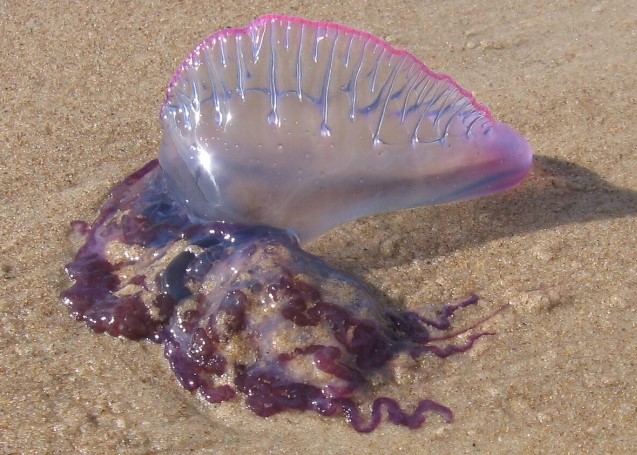
Image of a Portuguese Man-Of-War jellyfish.
Credit: Rhalah/Creative Commons Attribution-Share Alike 3.0
FIVE specimens of the dangerous Portuguese man-of-war jellyfish have been found on beaches in the Valencian Community so far this Summer.
Specifically, they were detected lifeless on the beaches of El Perellonet, El Saler, La Garrofera and Cabanyal. The first two were located last Thursday 27, on the Garrofera beach in El Saler, according to sources of lasprovincias.es.
A third jellyfish, also dead, was found later that same day on the sands of El Perellonet, near the town of El Recatí.
On the morning of Friday 28, a fourth was detected on the beach of El Saler, with bathers subsequently alerting the authorities to the discovery of a fifth one on the Cabanyal beach, near Las Arenas.
In the latter case, the Portuguese man-of-war was still alive. It was immediately removed from the area by an operative wearing gloves to avoid the danger of being stung by the creature.
It has to be pointed out that all five were isolated cases, and it was not necessary to close any of the beaches or raise the red flags.
Portuguese men-of-war normally inhabit warm waters
These marine animals are normally found in the open warmer waters, especially in tropical and subtropical regions of the Pacific or Indian Ocean, and in the Atlantic Gulf Stream.
Following recent reports from experts that the temperature of the Mediterranean is increasing to around 28°C, this could be one reason for the appearance of the Portuguese man-of-war along the Valencian coast.
This species has a gelatinous sail that allows them to travel the oceans driven by the winds. Each of its tentacles comprises more than a million stinging elements. It is a very urticaria species, which means that it stings if it feels threatened.
So far this Summer they have already been located in the waters of Galicia, Asturias, Cantabria and the Basque Country.
What to do in case of a jellyfish bite
In the Civil Protection and Samur guides, it details the best actions to take when stung by a marine animal and the prevention measures that must be carried out.
This information is useful not only in a case of a Portuguese man-of-war sting, but it may be suitable in cases that include other types of jellyfish, insects or snakes.
1. Do not remove or handle spines or tentacles without gloves or hand protection.
2. Wash the affected area with seawater, never with fresh water.
3. Remove the remains of tentacles with tweezers and do not drag them. In the case of jellyfish, the stinging tentacles must be removed with hot water or dry sand. In the case of another marine animal, you have to remove the thorn or spike if there is one. Be especially careful with the spines of sea urchins, as they break easily, leaving pieces under the skin.
4. Relieve pain by applying compresses soaked in water or lemon juice to the area. Apply cold intermittently without rubbing and without direct contact to relieve pain.
5. The affected area should not be scratched or rubbed or discomfort will increase.
6. If the reaction is urticating (hives on the skin), you should attend a medical centre. In case of sensitivity to bites, it is advisable to monitor the appearance of immediate or delayed allergic reactions and go to the Emergency Department or call 112.
Stay connected with us on social media platform for instant update click here to join our Twitter, & Facebook
We are now on Telegram. Click here to join our channel (@TechiUpdate) and stay updated with the latest Technology headlines.
For all the latest World News Click Here
